As I’ve previously mentioned, many fictional characters are as reluctant to resort to therapy as Americans are to use the metric system. These characters instead resort to ad-hoc self-treatments that are about as dubious as measuring radiation in terms of bananas. But there are still a few fictional characters who embrace therapy. You might be interested in the following five works that feature psychological counseling.
Satan: His Psychotherapy and Cure by the Unfortunate Dr. Kassler, J.S.P.S. by Jeremy Leven (1982)
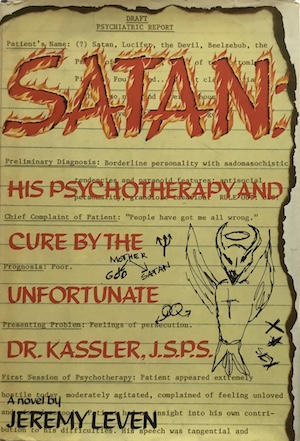
A series of unfortunate events, not least of which is his father’s death, lead Sy Kassler to the uncomfortable realization that he has done little good with his life so far. He vows to change. He earns a medical degree and will now be able to serve by providing the needy with psychological therapy.
Few require therapy quite as badly as Satan, who sees in Dr. Kassler the sympathetic ear that Satan craves. Dr. Kassler sees in Satan a desperate person to whom he might minister. Who knows what benefits will come from therapy?
The title is kind of a giveaway that whatever good therapy did for Satan, it did no good at all for Kessler.
Queen of Angels by Greg Bear (1990)
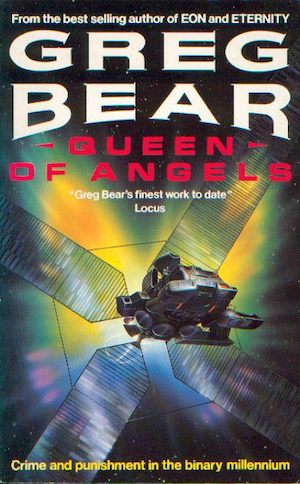
Thanks to nanotechnology, 2048 is a year of tranquil abundance. Therapy in particular has flourished. Nanotherapy transforms otherwise miserable people into content, productive members of society. Social ills once common are now rare. However, as Emmanuel Goldsmith’s eight murder victims could attest (were they not too dead), rare does not mean non-existent.
Why would a respected poet commit murder? Doctor Burke plans to determine the answer. To do so, he will have to delve deep into the dangerous landscape of Goldsmith’s mind.
Some readers may wonder if therapy and conversion into a placid worker bee is mandatory in the USA of 2048. It is not! Law-abiding citizens are free to be as miserable and maladjusted as they like, provided they don’t mind being relegated to second-class status.
From the Notebooks of Doctor Brain by Minister Faust (2007)
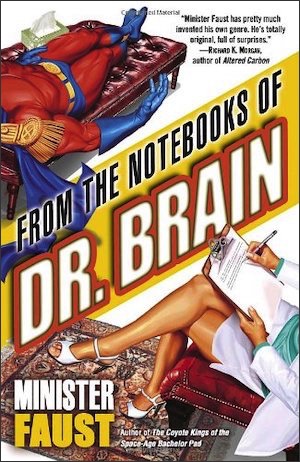
Many issues divide the members of the Fantastic Order of Justice. Triumphing over their enemies has given the FOOJ members an opportunity to understand just how much they loathe each other. The bickering becomes pronounced enough that all six members are ordered by their bosses to submit to mandatory therapy with Doctor Brain.
Guiding superheroes to admit their issues will be difficult. Guiding superheroes towards constructive action will be even more challenging.
Doctor Brain will have to work fast. A unkillable superhero is slain. The obvious suspects? Doctor Brain’s FOOJ patients.
Doctor Brain has another challenge facing her: it’s not at all clear that she’s any good at her job. On the plus side, being a lousy therapist with little hope of resolving her patients’ issues could be a guarantee of lifetime employment.
Of course, given the nature of her clients, that lifetime could be quite short.
Final Girls by Mira Grant (2017)
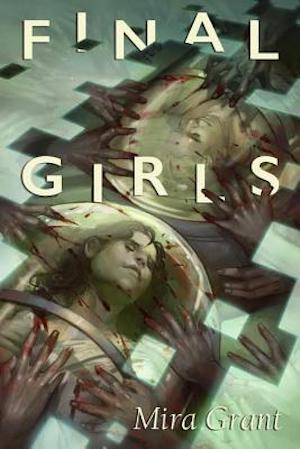
Jennifer Webb’s groundbreaking virtual reality-based treatment program could revolutionize therapy—if Webb can convince the world of her creation’s utility. Webb takes a calculated risk by seeking out professional debunker Esther Hoffman. All Webb needs to do is convince hard-core skeptic Hoffman that Webb’s methods work.
After considerable due diligence, Hoffman submits to Webb’s VR. A small complication presents itself: An industrial spy is determined to steal Webb’s research and to silence Webb herself. With Hoffman and Webb immersed in Webb’s virtual world, nothing could be easier than murdering scientist and journalist. At least, so it appears to the would-be killer.
Grant’s novel provides claustrophobic tension in spades. It’s best, having read it, to avoid thinking about just how helpless sleeping people are…particularly when one is preparing for bed.
The Infinite Noise by Lauren Shippen (2019)
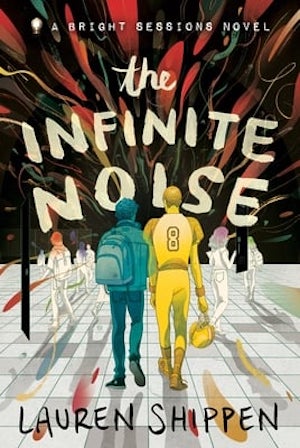
When struggling student Caleb provides a classroom bully with a well-deserved beating, the result is not universal accolades from a long-suffering world, or even a supportive pat on the head from approving teachers. Instead, Caleb is ordered into therapy with Doctor Bright.
Doctor Bright believes she has found the real reason for Caleb’s misery: Caleb has a bona fide superpower. He is a telepathic empath. What he lacks is control; that lack leaves him awash in other people’s emotions. Doctor Bright guides Caleb toward mastering his ability. This effort is successful but it leads to unforeseen consequences.
Unlike other mentors I could mention, Bright is interested in helping her patients rather than weaponizing superpowers. This may explain why the novel is less like Doom Patrol or X-Men than Netflix’s Sex Education.
***
No doubt examples abound that are not listed above. If I missed one of your favorites, feel free to mention it in comments below.
In the words of fanfiction author Musty181, four-time Hugo finalist, prolific book reviewer, and perennial Darwin Award nominee James Davis Nicoll “looks like a default mii with glasses.” His work has appeared in Interzone, Publishers Weekly and Romantic Times as well as on his own websites, James Nicoll Reviews (where he is assisted by editor Karen Lofstrom and web person Adrienne L. Travis) and the 2021, 2022, and 2023 Aurora Award finalist Young People Read Old SFF (where he is assisted by web person Adrienne L. Travis). His Patreon can be found here.











The most obvious example which I read recently (although the book is nearly half a century old): Frederick Pohl’s Gateway.
The first book I though of here was definitely Lathe of Heaven. Poor Dr. Haber, he just wants to help…
I’ve performed Melanie Safka’s “Psychotherapy” in filksings.
Sort of sympathy for the Devil.
In Hiding by Wilmar Shiras. Therapist tries to see what’s going on with an apparently normal young boy. Things….aren’t so normal and the therapist’s instincts are correct that the boy needs help.
A Civil Campaign, Lois McMaster Bujold. Lots of talk about the successful, if off-screen, Betan therapy received by Mark Vorkosigan.
Death’s Lady series by Rachel Neumeier, beginning with The Year’s Midnight. Daniel Dodson is an excellent psychiatrist. He’d like to help the young woman who came to inpatient treatment as Jane Doe. She’s so angry. And despite the sword she was carrying when found, surely her stories about her youth in another world can’t be real.
The Final Girl Support Group by Grady Hendrix. Group therapy for people in a world in which the slasher movies of the 1980s were historical documents.
Zelazny’s He Who Shapes was the first thing that came to mind for me.
I’m very fond of “Demonology and the Tri-Phasic Model of Trauma: An Integrative Approach”, a Good Omens fanfic by “Nnm”.
As I recall, Brunner’s Quicksand features a therapist determined to treat an amnesiac found wandering naked. Therapy provides illumination but not happiness.
An ancient one is “The Devil Was Sick” by Bruce Elliott, published in The Magazine of Fantasy and Science Fiction, April 1951, available at the Internet Archive.
In the far future, a student summons a demon as his thesis project, then takes it to the Sane Asylum where it’s cured by advanced technology:
Ryk Spoor’s Legend has, as one of its main characters, a psychologist who gets a visit from one of her world’s major superheroes, who is having quite a few issues. Fortunately everyone involved is competent. (Unfortunately, so is the main villain…)
I have a deep and abiding fondness of the therapists of the Golden Gulag from Hugh Cook’s The Wishstone & the Wonderworkers and The Wazir & the Witch.
Oh wait. No. Terror. That’s the word. Terror.
Along with everything else but the kitchen sink, Philip K. Dick’s The Simulacra has a psychoanalyst as one of the many viewpoint characters. In fact, Dr. Egon Superb is the last practicing psychoanalyst in a near (as of 1964) future US, given a special exemption from the law (promoted by pharmaceutical corporations) that mandates only drugs as legal treatments for mental illness. His job, if he’s to stay in business, is to treat paranoid schizophrenic pianist Richard Kongrosian, a man with potentially very dangerous telekinetic powers. The director of the National Police himself has given Dr. Superb his orders: to treat Kongrosian, but maybe not to actually help him.
At the end of Bujold’s Shards of Honor, Cordelia has to escape Beta in order to avoid unwanted but mandatory trauma therapy.
I suppose all the inhabitants of Seanan McGuire’s Home for Wayward Children were placed there by their parents in hopes of receiving some sort of therapy.
Elizabeth Moon’s Once a Hero spends much of its plot time on therapy two of the protagonists are undergoing.
It’s refreshing to read a space military story where the space military in question proactively looks after its members’ mental health.
Not SF but I got hooked on the Harry Bosch procedurals because in the first one I tried, he punched a co-worker (his boss, maybe?) and was immediately told to attend anger management classes.
The space warriors of Jack Campbell’s “The Lost Fleet”, officers anyway, discuss therapy after several volumes and 100 years of starship battles with heavy casualties and a shortening cast list. But it isn’t shown in what I’ve read of the series, they are just, “Oh, you are in therapy, aren’t you?” “Yes, and it helps.” “That’s good. I was going to recommend it.”
Several officers are simply insane in various ways.
There are interrogation scenes where lie detection equipment is in use, but whether it’s also employed by therapists is unclear.
Ben Aaronovitch’s young police wizard Peter Grant was recommended therapy in a recent book by Thomas Nightingale, an older wizard who was traumatised in the Second World War. Peter’s narration then mentions this a few times. As first person accounts of events, the books might actually be therapy sessions, with Peter doing all of the talking, except that “my therapist” probably would be named “you”. A few stories in the setting have a different principal character. Peter has accumulated his own anxieties from experiences in the books. In “Whispers Under Ground”, I think, he mentions being not being offered counselling after an incident where he felt a need for it, but he says to us that unspoken police etiquette is that if he asks for it, he loses face. In novel “Lies Sleeping”, another police officer liaising with the magic department has a kind of mental breakdown as a result. Peter sees him acting increasingly oddly and, again, he tells us that etiquette doesn’t allow him to speak to the officer or to supervisors about it.
The guy, guys, in Roger Zelazny’s Amber books also do some first person introspection, including closing out episodes that they don’t feel like describing. In the fifth book, Prince Corwin gets to the part where he meets the person he’s been telling the story to before now.
This month’s Unstoppable Doom Patrol (issue 4) has members of the team undergoing therapy sessions from a doctor who channels five fifth-dimensional entities (think citizens from Mr. Mxyzptlk’s realm) to help with the sessions:
(Copyright 2023 DC Comics)
In Wyman Guin’s “Beyond Bedlam“, a psychiatric revolution has led to everyone having schizophrenia-as-it-was-then-understood: they have two complete personalities which formally alternate control of the one body. “Medicops” help personalities sort out issues with each other’s use of the body and make sure everyone takes the drugs that keep two personalities in balance.
There is a sardonic story from the 1950’s in which everyone is desperately trying to scrape together money for therapy, and the people in therapy are dreaming (hopelessly) of the time when they’ll be pronounced Cured. I thought this was from one of Pohl’s original-anthology series Star Science Fiction, but none of the titles seem to fit; does this outline ring a bell for anyone?
“A Wild Surmise” (Kuttner and Moore) features two patients, one Terran and one resembling an ant, each being treated for the ~delusion that he’s the imaginary other. Unlike the above two, this is played for a joke with a twist ending. K&M were reportedly such close collaborators that one could leave their common typewriter in the middle of a sentence and the other would pick up seamlessly; in this case one can imagine each wrote one of the patient-and-therapist pairs, but I haven’t seen anything discussing the idea — writers that far back often didn’t tell how stories came about.
I recall Stross mentioning in 2015 that the next Laundry book was going to involve Bob and Mo going to a marriage counselor (after finding one that was approved to hear what they had to say), but ISTR he said later that the series had taken another direction, even before it shifted to other characters further into CODE NIGHTMARE GREEN or whatever that scenario became.
Don’t forget suitcase psychiatrist Dr. Smile in Philip K. Dick’s The Three Stigmata of Palmer Eldritch — although his job isn’t to cure his patient, but to drive him just insane enough to dodge a colonization draft. One of the wildest elements in one of PKD’s wildest novels.
@1/@2 took my first two thoughts.
@17: Note that in the Campbell books, there’s a common psychiatric syndrome named after the main character (which the main character is accused of having).
Another Galaxy story is Name Your Symptom by Jim Harmon which has an increasingly large number of people given devices that mitigate psychiatric symptoms (the main characters are concerned that the threshold for being prescribed such a device is getting pretty low).
Pat Cadigan’s novel Mindplayers is all about the therapy, with a whole new set of tools for doing it. The first person narrator becomes a therapist, in addition to having one.
I don’t think we can ignore Marvel Comics’ character Dr. Karla Sofen in this context. She’s the supervillain known as Moonstone. She’s not the original supervillain known as Moonstone. She was, however, the therapist who persuaded the original Moonstone to reform and give up the source of his superpowers. To her. She may be a supervillain, but she knows her stuff.
…and nobody’s mentioned Counsellor Deanna Troi? Granted, she was rarely shown actually counselling, but it did happen.
In Ryk E. Spoor’s Legend, the world is full of superheroes fighting supervillains. Jennifer Hsui ends up being the go-to shrink for the superheroes.
Already mentioned at # 11. I missed that.
My first thought was Sturgeon’s “Baby Is Three”, which I think is better as a stand-alone than it was in More Than Human.
Delany taught a course about therapy in SF– there’s an essay about it which I can’t find. Anyone know where it was published?
Delany’s Babel-17 has a therapist.
Tom Purdom wrote the story about the society where everyone is going nuts trying to make enough money for definitively good therapy, but I don’t remember the title.
GATEWAY
In Poul Anderson’s “Operation Afreet”, Captain Virginia Graylock psychoanalyzes the eponymous djinn. She’s a very good therapist, but of course curing it was never the goal.
@7: A similar high concept is found in Daryl Gregory’s excellent novella _We Are All Completely Fine_. It’s not just final girls, but an assortment of survivors of supernatural horror stories, doing group therapy to help with their various horror-related trauma.
There’s also the 1967 film The President’s Analyst. The protagonist gets given the title job, but finds it too stressful and wants to quit. However, spy agencies from around the world see him as a valuable resource, and he ends up being the McGuffin in a Bond-esque comedy of errors.
It was still a hilarious over-the-top satire when I first encountered it in the late 70s or early 80s. Sadly, it has succumbed to Satire Rot since then, as reality has out-paced it in essentially every respect. Still a great paranoid performance from James Coburn, at least.
The Sky So Big And Black, by Barnes, has an entire retrospective narrative told in the form of a series of child therapy sessions. The reason for the therapy is the dramatic twist.
Ray Bradbury’s The Man in the Rorschach Shirt.
John Kovalic’s Doctor Blink, Superhero Shrink is a fun parody of the “Superheroes need counselling” genre.
@19: some fanfic author named cstross* put a cutting-room-floor fic on AO3 about that idea: https://archiveofourown.org/works/8921515/chapters/20434975
*Take a wild guess. :-P
MCA Hogarth’s Dreamhealers series, beginning with Mindtouch, has two university students in a multispecies culture learning to be xenopsychologists. They go through coursework, practicum, residency, and graduate to form their own joint practice.
Ursula K. Le Guin’s The Lathe of Heaven has Dr. Haber treating a man with the delusion that his dreams have the power to change reality. And then discovers that his patient isn’t delusional.
In Spinrad’s “It’s a Bird! It’s a plane!” Dr. Felic Funck is treating Superman Syndrome, an epidemic of people with the delusion that they are secretly their wish fulfillment figure of Superman. Of course Dr. Funck had his own secret…
@26: Thanks! I was wondering whether the story might be Purdom’s “The Holy Grail”, which first appeared in Star Science Fiction No. 6; unfortunately that’s one of the many books which I used to own a copy of. (Why did I punt that but keep the first two? Damfino….)
@34: TFTI — at least the fun is preserved even if it’s not canon.
@34 Thank you for that snippet!
“Vell, Zaphod is just this guy, you know.”
(Bit surprised I appear to be the first to bring this one up)
Cyberpunk TV series *Mr. Robot* is largely driven by Elliot’s process through therapy (including the self-analyzing narration he provides to his imaginary friend –i.e., the audience). His therapist is a recurring character, who genuinely wants to help and demonstrates patience and keen insight, though she is unprepared for just how messed-up Elliot is.
There’s a short story, by Sheckley I think, about a man who has the misfortune to be treated by a mechanical therapist set to “Martian.” (for that matter Philip J. Fry is given therapy based on the assumption that he’s a robot)
Chip @19: yeah, the Brexit referendum upset of 2016 forced a rewrite with no room for the marriage guidance subplot.
Good news, though: you can find it on AO3: The Howard/O’Brien Relate Counseling Session Transcripts.
https://www.gutenberg.org/files/9055/9055-h/9055-h.htm
42. The Sheckley story– “Bad Medicine”.
@44: Thanks Nancy!
There’s a short story by Idris Seabright (Margaret St. Clair) called Short In The Chest. The therapist is a robot, with its own troubles.
IIRC (can’t lay my hands on the relevant pile) Elizabeth Bear’s Synarche, in Ancestral Night, offers citizens more-or-less constant high tech therapy via AI implants.
@25 I don’t remember the therapist in “Baby is Three” (it’s been some time since I read it), but two other Theodore Sturgeon stories I can think of that fit the theme: The novel Some of Your Blood and the short story “And Now the News”. I think there are probably others that don’t come to mind right away.
EJF
@25 I don’t remember the therapist in “Baby is Three”
The framing story is a visit to the shrink. At the end of the tale, They remove his memory of the therapeutic session.